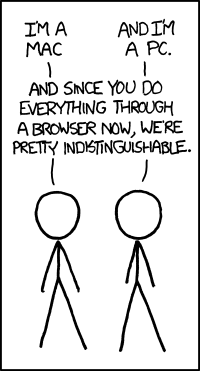A couple of things cropped up today. Microsoft were looking for user feedback – I’m happy to give this for the most part so that was done.
Then there was *that* argument. I stopped reading Slashdot because of *that* argument and I think I’ve written about it before on previous sites. It relates to computer operating systems and the tribalism that goes with them.
I run iOS on my mobile devices. I run Windows on my personal computer, Windows is applied to me at work and as far as business systems are concerned, I have a lot of experience with an IBM mainframe.
*That* argument first raised its head in a discussion on mainframes. Put simply, a significant number of slashdot readers were of the opinion that mainframes were obsolete, and should be replaced by Linux server farms. I think that was the first time I came into contact with Linux fanboys to be honest and it was not a pleasant relationship. A key issue I had with the whole argument was that they were unfamiliar with what mainframes did, had to do, but assumed their shiny server farms could do it because they were expert in Linux and loads of servers and…
That’s not to say they couldn’t do what mainframes did. But because they didn’t know exactly what mainframes did, and what was required of said mainframes, they weren’t, in my opinion, qualified to comment one way or the other. *That* debate was interesting because you could see a key difference between basically two generations (I’m comparatively young and most mainframe experts are generally older than me). The older guys, the guys who knew large systems, took the view that there were many systems and many tasks and no system was appropriate for all tasks. That there were some things that mainframes did better, and some things that more modern server farms did better, and likewise on the desktop front. You could not argue that only one OS was able to do everything. It could but that didn’t mean it was any good at it.
Debates of this nature wear me out. Today it was desktop related. One key argument given in favour of anything other than Microsoft Windows is that it’s a) easier to configure and b) easier to use than Windows. In other words, Windows is the worst.
Again, and again, and again, it’s really not that simple. Windows is actually very easy to plug in and play. It’s when you want to do something outside the box that it can be not straightforward. But that lack of straightforwardness is often accepted as normal for Linux installs. And the software you might want to use may not have a Linux version. Photoshop is a key example.
It’s not that there aren’t functional equivalents, and in the Linux world, yes, there is the Gimp. But I’ve used it. And I have paid for Photoshop because it has been worth it to me.
Probably the easiest plug and plays are Macs. But if you’re a technogeek who likes messing around with the innards of an OS, it may not be the best choice for you. In fact, given the way Apple are going with their mobile devices it almost certainly won’t be in the long term.
Ultimately, the point I am making is that it is not true that Linux or Mac or Windows is the only answer to the question. Different OSs, different systems do different things better or worse. It’s almost like the laws of comparative advantage. So your main objective shouldn’t be to religiously devote yourself to one OS. I’m really not impressed if you say unto me that you do everything in Linux because in the grand scheme of things, that does not render you qualified to imply that everyone should do things your way or, indeed, that everyone needs to accomplish the same tasks as you. In other words, different tools fit different requirements and this is true even at the OS level.
Interestingly enough, as it happens, Microsoft, in their user survey today, were all about Google and not, for example, Linux or Mac. As noted by this particularly interesting xkcd:
The game is changing, basically.
ETA: This post was written before I heard that Steve Jobs had died.
